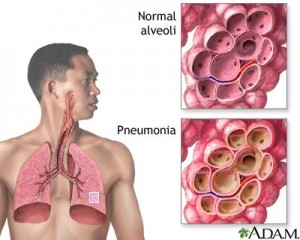Doctors in Uganda are warning that pneumonia is on increase in children due to uncompleted immunization courses among other predisposing factors.
Dr. Sabrina Etaka the Chairperson of doctors specialized in children related diseases says that the disease is increasing because some children born to mothers with HIV/AIDS receive prevention of mother to child transmission of HIV/AIDS but other diseases that make a child vulnerable to pneumonia are not attended to.

Dr. Sabrina advises parents to desist from using local candles which emit soot in the house. She says that soot is dangerous to children and it causes pneumonia.
She recommends the parents to avoid cooking in houses where children take long time using fuels that emit a lot of smoke.
Pneumonia is a form of acute respiratory infection that affects the lungs. The lungs are made up of small sacs called alveoli, which fill with air when a healthy person breathes. When an individual has pneumonia, the alveoli are filled with pus and fluid, which makes breathing painful and limits oxygen intake.
THE Wolrd Health Organisation recommends accelerated pneumonia control with a combination of interventions to protect, prevent, and treat pneumonia in children with actions to:
- protect children from pneumonia include promoting exclusive breastfeeding and hand washing, and reducing indoor air pollution;
- prevent pneumonia with vaccinations;
- treat pneumonia are focused on making sure that every sick child has access to the right kind of care — either from a community-based health worker, or in a health facility if the disease is severe — and can get the antibiotics and oxygen they need to get well.
- Pneumonia is the leading cause of death in children worldwide.
- Pneumonia kills an estimated 1.6 million children every year – more than AIDS, malaria and tuberculosis combined.
- Pneumonia can be caused by viruses, bacteria or fungi.
- Pneumonia can be prevented by immunization, adequate nutrition and by addressing environmental factors.
- Pneumonia can be treated with antibiotics, but less than 20% of children with pneumonia receive the antibiotics they need.
Key facts from World Health Organisation
Causes
Pneumonia is caused by a number of infectious agents, including viruses, bacteria and fungi. The most common are:
- Streptococcus pneumoniae – the most common cause of bacterial pneumonia in children;
- Haemophilus influenzae type b (Hib) – the second most common cause of bacterial pneumonia;
- respiratory syncytial virus is the most common viral cause of pneumonia;
- in infants infected with HIV, Pneumocystis jiroveci is one of the commonest causes of pneumonia, responsible for at least one quarter of all pneumonia deaths in HIV-infected infants.
Symptoms
The symptoms of viral and bacterial pneumonia are similar. However, the symptoms of viral pneumonia may be more numerous than the symptoms of bacterial pneumonia.
The symptoms of pneumonia include:
- rapid or difficult breathing
- cough
- fever
- chills
- loss of appetite
- wheezing (more common in viral infections).















